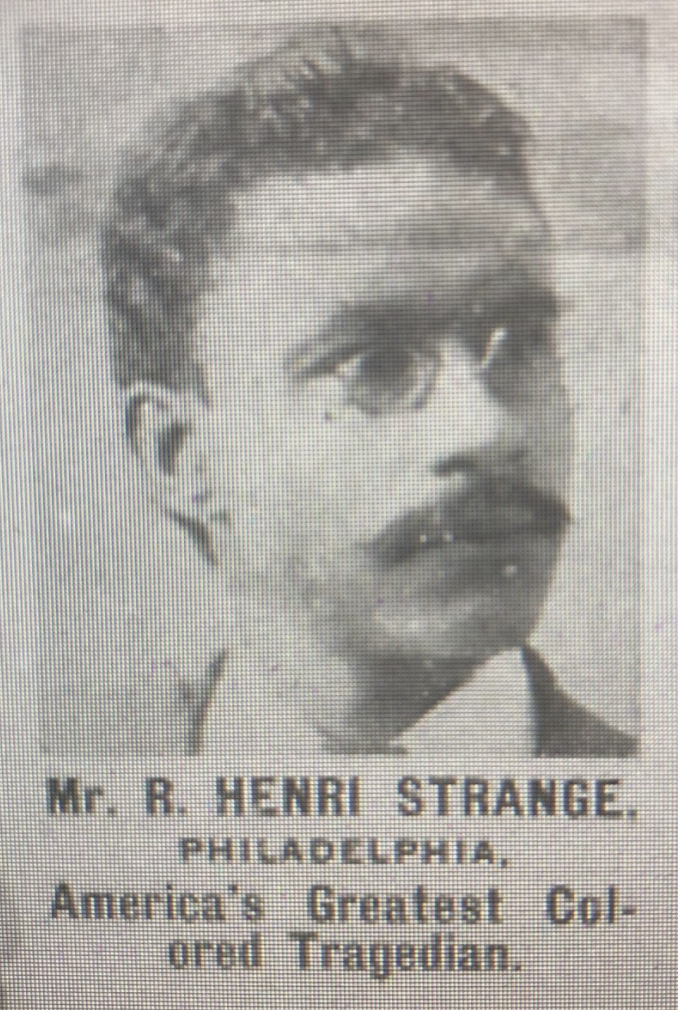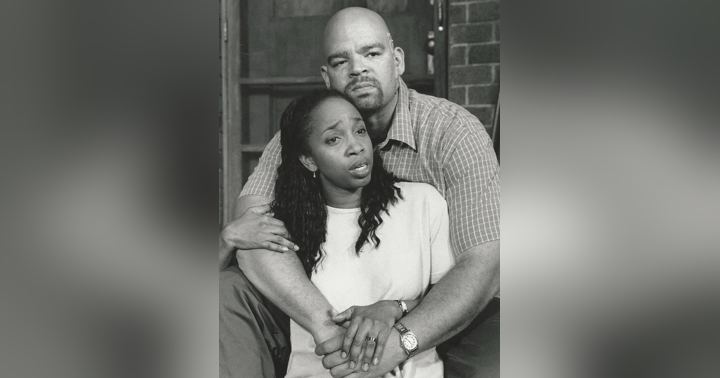
Above, John A. Arneaux, in a photo printed in the pages of his privately published edition of Shakespeare's Historical Tragedy of Richard III: Adapted for Amateurs And the Drawing Room. It is quite similar to the Edwin Booth acting version, but it cuts out some of material that English actor Colley Cibber had inserted into the text, back in the early 18th Century. Cibber's version was one that many actors, such as Booth, continued to employ. Arneaux, for his part, preferred to begin the play with Richard's soliloquy "Now is the winter of our discontent . . ", which is indeed how the text is usually performed today. Below is the the title page of his book.
In this episode, we mention that Arneaux rented the costumes and set of the actor Frederick Warde, who had been performing at the Academy of Music in November of 1886. Thanks to the help of Eric Colleary at the Harry Ransom Center at the University of Texas in Austin, I was able to locate an image of Warde as Richard III. You can see that Warde's costume was very similar to that of Edwin Booth's in the role. Arneaux may have imitated Booth in many things, but he had a clearly different concept of Richard III's looks and movement.
You can still see Warde perform 'Richard III', by the way. In 1912 he made an early silent film of the play. It was restored in 1997 and given a score by Ennio Moricone. It's on YouTube! A relic of a long-forgotten era in American theater. https://www.youtube.com/watch?v=e2leDwxeROs&t=293s
Here is one additional image of Arneaux as Richard III. It was printed in several newspaper articles about him at the time. Like other images of him, it must have been based off a photograph which is now lost. Perhaps these will turn up some day.
Above, the beginning of the column in the January 30, 1887 Philadelphia Times, detailing the performance of Richard III. We have drawn heavily from this account for our description of what happened that evening.
Below, the January 1887 printed program for Richard III at the Academy of Music. This document is in the collection of the Historical Society of Pennsylvania, in their archive of items related to the Academy. I believe this may be the only remaining copy of this program still extant, so it's a very rare and precious item. I was very proud of myself when I first came across it a few years ago on a research trip to the HSP, and I'd like to thank the curators and staff there for their assistance.
Interestingly, John Butler, the young Philadelphia who received applause for his one line as the Captain of the Guard in 1887, was promoted to playing King Henry VI in Henri Strange's version of Richard III at the Academy just 4 years later. (Mr. Hulley had presumably had experienced enough of the role in Arneaux's show, and did not want to repeat it.) The cast list is from The Item, a Philadelphia newspaper that heavily promoted Strange and Teagle's efforts.
There were several illustrations of R. Henri Strange in a lengthy article profiling Strange and his company in the Philadelphia Inquirer on May 31, 1891. The text veers from insightful and sympathetic to condescending and outright racist, but I think it was meant to be helpful to him, in some way. At any rate, it included several engravings of Strange, evidently based on photographs. One is labeled as being him as 'Richard III', but I think he's actually in costume as Hamlet:
Here are two other photos of R. Henri Strange which I found in microfilmed copies of the Dorsey Archives, a collection of scrapbooks by William Dorsey, held in the collection of the library of Cheyney University - a descendant of the Catto Institute where Strange had once gone to school. Once again, my deepest thanks to helpful librarians!
Finally I'd like to share the promised photo of R. Henri Strange as King Menelik, along with Ada Overton Walker and Bert Williams in Abyssinia, in 1906. It's from the online collection of the New York Public Library Billy Rose Collection, and although Strange is not directly identified by the curator, comparing it to the other photos we can see it's clearly him. (NB Bert Williams, though himself Black, always performed in blackface makeup. There is a complex justification behind the practice of negro comedians of the day "blacking up", which has been covered by many better historians than myself.)
Selected Bibliography for Episodes 25 & 26
Books & Journal Articles:
Alnutt, Brian E., African-American Amusement and Entertainment in Philadelphia, 1876-1926. Unpublished doctoral dissertation for Lehigh University, 2003.
Arneaux, J. A., Shakespeare's Historical Tragedy of Richard III: Adapted for Amateurs And the Drawing Room. New York, 1886. (Accessed online via HathiTrust)
Bloom, Arthur W., Edwin Booth : A Biography and Performance History, McFarland & Company, Incorporated Publishers, 2013.
Breon, Robin, "The Theatrical Career of Samuel Morgan Smith, by Bernth Lindfors", Critical Stages/Scènes critiques: The IATC journal/Revue de l'AICT – December/Décembre 2019: Issue No 20.
DeCosta-Willis, Miriam, The Memphis Diary of Ida B. Wells, An Intimate Portrait of the Activist as a Young Woman, Beacon Press, 1995.
Hill, Errol, Shakespeare in Sable: A History of Black Shakespearean Actors, University of Massachusetts Press, 1984.
Hill, Errol G., and James V. Hatch, A History of African American Theatre, Cambridge University Press, 2003.
Hovde, Sarah, “Folger Finds: An Edition of Richard III ‘adapted for amateurs’ “, Shakespeare & Beyond website. Online article published by the Folger Shakespeare Library, September 20, 2018.
Jackson, Joseph, “The Shakespeare Tradition in Philadelphia’, The Pennsylvania Magazine of History and Biography, Vol. 40, No. 2 (1916).
Peterson, Bernard L., Profiles of African American Stage Performers and Theatre People, 1816-1960, Greenwood Press, 2001.
Royster, Francesca D., “Playing with (a) Difference: Early Black Shakespearean Actors, Blackface and Whiteface”, Shakespeare in American LIfe, Virginia Mason Vaugh and Alden T. Vaughan, editors. Folger Shakespeare Library, Washington D.C, 2007.
Sampson, Henry T., The Ghost Walks - A Chronological History of Blacks in Show Business: 1865-1910. The Scarecrow Press Inc. Metuchen, New Jersey and London, 1988, p. 292.
Simmons, William J., Men of Mark: Eminent, Progressive and Rising. Geo. M. Rewell & Co., Cleveland, Ohio, 1887. Accessed online via Google Books.
Watermeier, Daniel J., American Tragedian: The Life of Edwin Booth. University of Missouri Press, 2015.
Watermeier, Daniel J, editor, Between Actor and Critic: Selected Letters of Edwin Booth and William Winter, Princeton University Press, 1971.
(NOTE: I have citations for literally dozens and dozens of contemporary newspaper articles about John A. Arneaux and Henri Strange. Most of them were found through laborious searches on ProQuest America's Historical Newspapers, some on Newspapers.com, and some on Old Fulton's Post Cards. Some were found in a scrapbook in the collection of the Kislak Center for Special Collections at the University of Pennsylvania. I won't list them all here, but if you'd like to contact me for any specific reference I made during either of these episodes, please feel free to email me at AITHpodcast@gmail.com.)


















